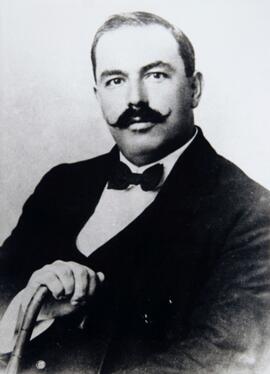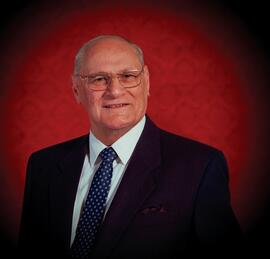Dr G. Borg Olivier, was born in Valletta on the 5th July, 1911. He was educated at the Lyceum, Malta, and the Royal university of Malta where he graduated Doctor of Laws in 1937. He obtained his notarial warrant a year later.
He joined the nationalist Party in 1939 and till 1945 he was one of the three PN representatives elected to the Council Government. With the return of responsible Government in 1947 Dr Borg Olivier was elected to the Legislative Assembly and was later Deputy Leader of the Opposition.
In 1950 he held the post of Minister of Works and Reconstruction and the post of Minister of Education in the Nationalist Minority Government led by Dr Enrico Mizzi. He succeeded Dr Mizzi as leader of the Nationalist Party, Prime Minster and Minister of Justice in a Minority Government on the latter's death in December 1950.
He was Prime Minister of Malta on two occasions: from 1950–1955 and from 1962–1971 (he also assumed, during the second mandate, the portfolio of Minister of Economic Planning and Finance).
Borg Olivier believed in the economic and social development of Malta as a viable independent state and in the necessity of a mixed economy. His administrations had pursued corporatist policies to develop the tourism industry and construction as the engine of growth. Under his leadership, average living standards rose steadily as Malta began to decouple from a fortress economy purely dependent on the British military establishment.
During his second administration he had proceeded to London to ask for a financial agreement and demand Independence with full membership within the Commonwealth. After having had a series of talks with the British Government and after preparing a Constitution for an independent Malta, which was endorsed by Parliament and approved by the people in a referendum held in February 1964, Dr George Borg Olivier set 21st September as Malta's Independence Day.
In March 1965, he became Minister of commonwealth and Foreign Affairs in addition to his duties as Prime Minister and Minister of Economic Planning and Finance.
In the General Elections held in March 1966, the Nationalist Party was again returned to power with Dr Borg Olivier as Prime Minister and Minister of Commonwealth and Foreign Affairs.
Malta joined the United Nations, the Council of Europe and the Commonwealth and in 1970 he associated Malta with the European Economic Community.
After two electoral defeats in 1971 and 1976, Borg Olivier resigned as Leader of the Nationalist Party in 1977. He retained his parliamentary seat until his death in 1980.
Honours:
On the 14th June, 1968, Dr Borg Olivier was decorated with the Grand Cross of Merit of the Order of Malta by the Grand Master of the Sovereign Military Hospitallier Order of St. John of Jerusalem, of Rhodes and of Malta.
On Independence Day, the degree of Doctor of literature (Honoris Causa) was conferred upon him by the Royal University of Malta.
On 25th January, 1964, Dr Borg Olivier was made a Knight Grand Cross of the Order of St. Sylvester, Pope, by His Holiness Pope Paul VI.

